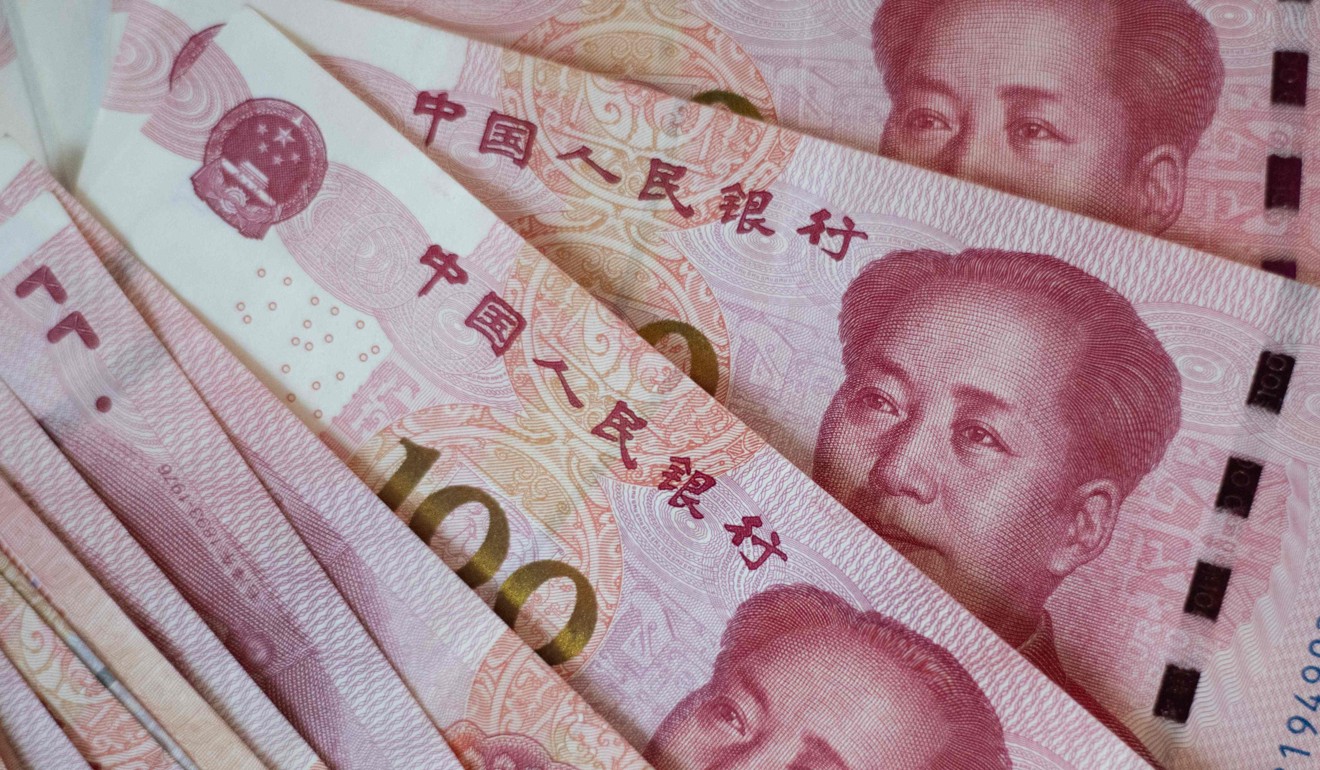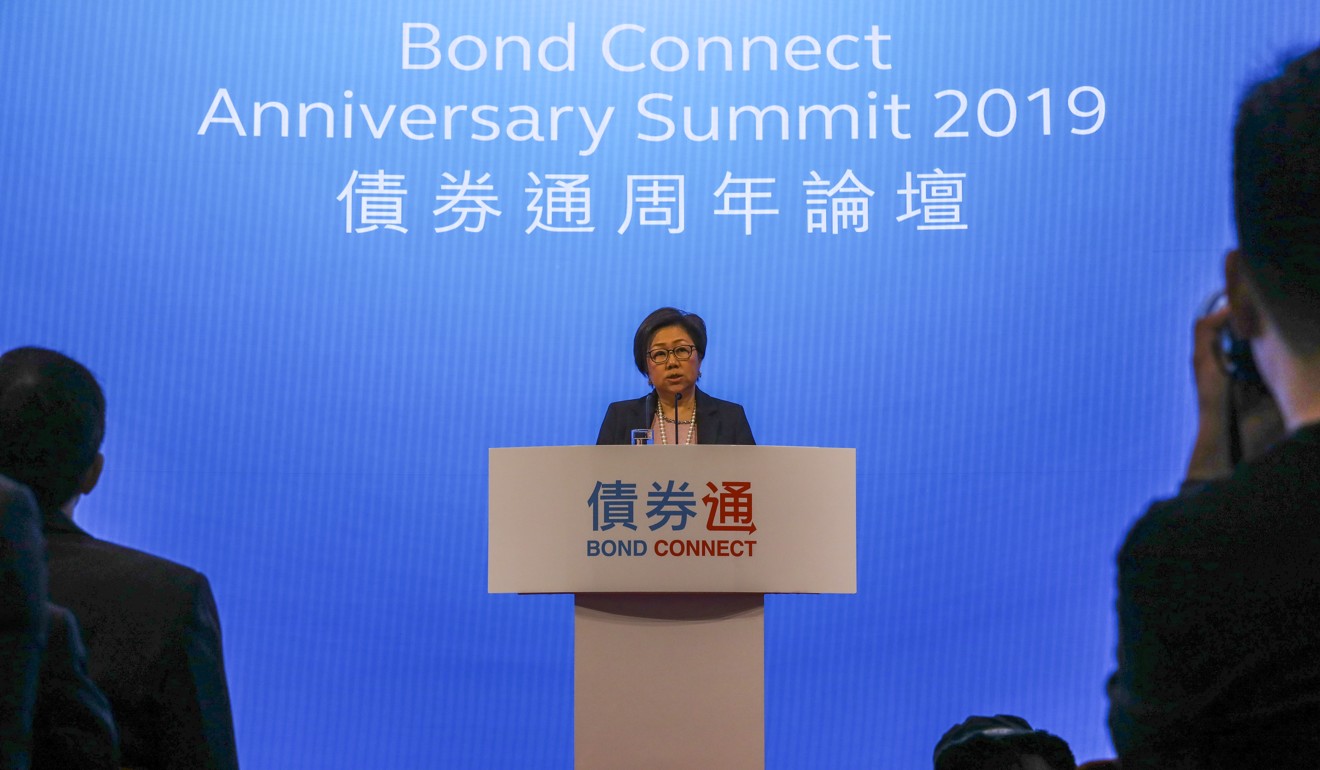How China’s onshore bond market can overcome the US trade war, a slumping yuan and slowing growth
- Beijing’s preemptive policy reforms have substantially increased demand for the onshore bond market in recent years. Even the declining value of the Chinese currency looks temporary, as increased overseas business means more use

A weak yuan, lingering trade tensions and slower growth might seem like the perfect storm for China. But the country’s US$13 trillion onshore bond market is well placed to overcome these challenges.
The renminbi has recently fallen through the key seven-to-the-dollar level for the first time in a decade. Volatility will prevail in the short term but there are good reasons for the currency to regain ground further down the road.
For one, China appears to be building up a trade surplus as exports with neighbouring countries have picked up, filling the gap left by the exodus of American buyers, at a time when imports are falling.
Interest rate differentials between China and the US, and other developed economies, are widening as investors expect central banks of major industrialised nations to provide monetary stimulus to support the economy.
China, on the other hand, is unlikely to cut the benchmark cost of borrowing aggressively. Instead, it will implement targeted policy measures designed to support small and medium-sized companies – those most vulnerable to the negative effects of the trade war – while reducing private-sector debt.
Furthermore, the People’s Bank of China has been providing sufficient liquidity to the financial system through different policy tools, such as open market operations, medium-term lending facilities and cuts in reserve requirement ratios. All of these should be beneficial for the onshore bond market.
Over the long term, the renminbi has the potential to appreciate as it evolves into a major international unit of exchange, providing onshore bond investors with an additional source of return. The use of the Chinese currency is also growing as neighbouring countries settle trade contracts and borrow the renminbi, in part due to the global activities of Chinese corporations, as well as large infrastructure projects under the Belt and Road Initiative.
But Beijing’s policy measures do not end there. As the country ages rapidly, inflation pressure will ease, growth will moderate and there will be more demand for investments that provide income with low volatility. Aware of this looming change, monetary authorities have introduced reforms to liberalise capital markets and attract overseas investment. And crucial to this is the opening up of China’s onshore bond market.
Since the 2017 launch of the “Bond Connect” programme, which allows foreign investors to trade in Hong Kong without onshore accounts, Chinese authorities have introduced the “delivery-versus-payment” feature that has significantly reduced settlement risks.

Foreign institutional investors also get a three-year tax exemption on bond interest until November 2021. Furthermore, the PBOC plans to relax rules on repo and other derivatives trading for foreign investors.
These steps should encourage more global index providers to incorporate Chinese bonds in their mainstream international bond benchmarks.
In anticipation of such moves, foreign holdings of onshore bonds hit a record 2 trillion yuan (about US$280 billion) in the second quarter, an all-time high, from just under 1.8 trillion yuan at the end of 2018. International investors currently hold just 2 per cent of such bonds, but this figure is bound to rise in the coming years.
Renminbi bonds present attractive yields for investors at a time when a record US$16 trillion of global bonds are yielding below zero. As of August 26, the yield on 10-year Chinese government bonds stood at 3.03 per cent, compared with 1.45 per cent for US Treasuries, minus 0.28 per cent for Japanese government bonds and minus 0.68 per cent for German Bunds with the same maturity.

Chinese bonds should be an essential asset for international investors in their diversified portfolio. The correlation between Chinese onshore bonds and US Treasuries is a low 20 per cent. Chinese onshore bonds’ correlation with US and European equities are even lower.
Also reassuring is the market’s default rate, which at less than 1.5 per cent remains below that of many developed and other emerging markets.
There’s no reason to expect a spike in default rates or systemic refinancing risks in the asset class. Chinese authorities are cracking down on riskier lending practices to contain risks to the financial system, while urging banks to lend to smaller companies.
For example, they are closing regulatory gaps in asset management business to curb growth of shadow banking activities while banning local government off-budget borrowing through funding vehicles or public-private partnerships to reduce indebtedness in this sector.
The onshore renminbi bond market is set to grow rapidly to satisfy the changing needs of the world’s second-largest economy. Despite short-term challenges, renminbi onshore bonds remain attractive, and they should evolve into an asset class of global significance.
Cary Yeung is the head of Greater China debt AT Pictet Asset Management